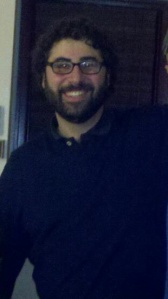
Michael Y. Bennett CCAS/UHP ’02 graduated from the University Honors Program with a major in English. Michael is an assistant professor of English in drama at the University of Wisconsin-Whitewater. He is the author of three books, all published by Palgrave Macmillan: Reassessing the Theatre of the Absurd (2011); Words, Space, and the Audience (2012); and Narrating the Past through Theatre (forthcoming October 2012). His is currently under contract with Cambridge University Press to write The Cambridge Introduction to the Absurd.
I began my four years in the UHP at GWU as an English major, but I wanted, ultimately, to go to medical school. My plan proceeded without a hiccup through my freshman year. But one day during my sophomore year, during Organic Chemistry, I had an epiphany and realized that I needed to do something more creative. I spent the next year and a half searching for that something.
After considering one profession after another, I finally decided that I wanted to be an elementary school principal. Once I was settled on my new career path, I studied abroad the Spring semester of my junior year in Seville, Spain. One night in Seville, sitting outside at a Flemenco bar with about seven fellow Americans in my study abroad program, someone brought up (very randomly) how much he hated Beowulf. I asked why, since I loved it in a class taught by Prof. Robert Combs in my freshman year Honors proseminar. He said he hated that his professor made the entire story about the symbolism of the phallus. I proceeded to tell him, and the six or so other American juniors, everything that Prof. Combs taught us about Beowulf. When I finished, this same guy said to me (and the sentiment was echoed by everyone else who was there), “I wish my English professor taught it to me like you just taught it to me. I would have liked Beowulf… You should be an English professor.” So from that point on, largely thanks to those couple of classes taught by Prof. Combs in my freshman year proseminar, I decided to become an English professor.
The path, however, to becoming an English professor is long and arduous. My success in, ultimately, becoming an English professor is marked, most especially, by the strong connections I made with my professors both in the Honors Program and in the English department. (I still keep in regular contact with four professors from GWU.) And this is the very advice that I hope to relay to you: connect to your professors, build lasting relationships with them, let them get to know you, and get to know them. The small class sizes and intimate nature of the Honors Program allow students to really form close bonds with their professors. The Honors Program at GW is so well situated in higher education because your fellow students (many of whom, and maybe you, may have turned down admission to Ivy League or equivalent schools) are the best and the brightest, your professors are at the top of their field, and yet the Honors Program affords its students the ability to really connect to one another and to the professors. There are few places in the world where academic excellence is stressed by leading academics who want to both teach you and get to know each and every one of you.
Skip to content
University Honors Program Blog
Intellectual Omnivores Unite
